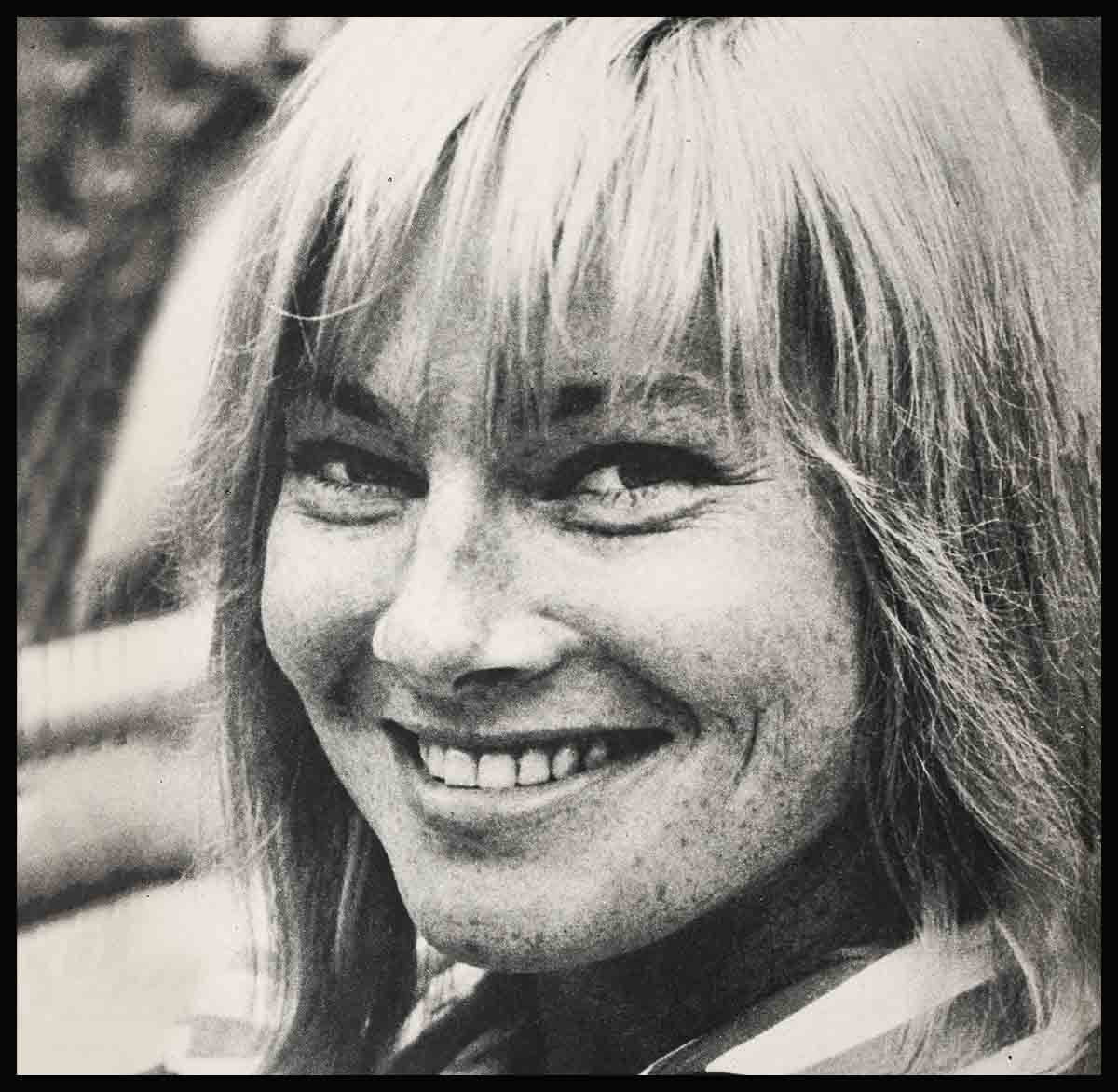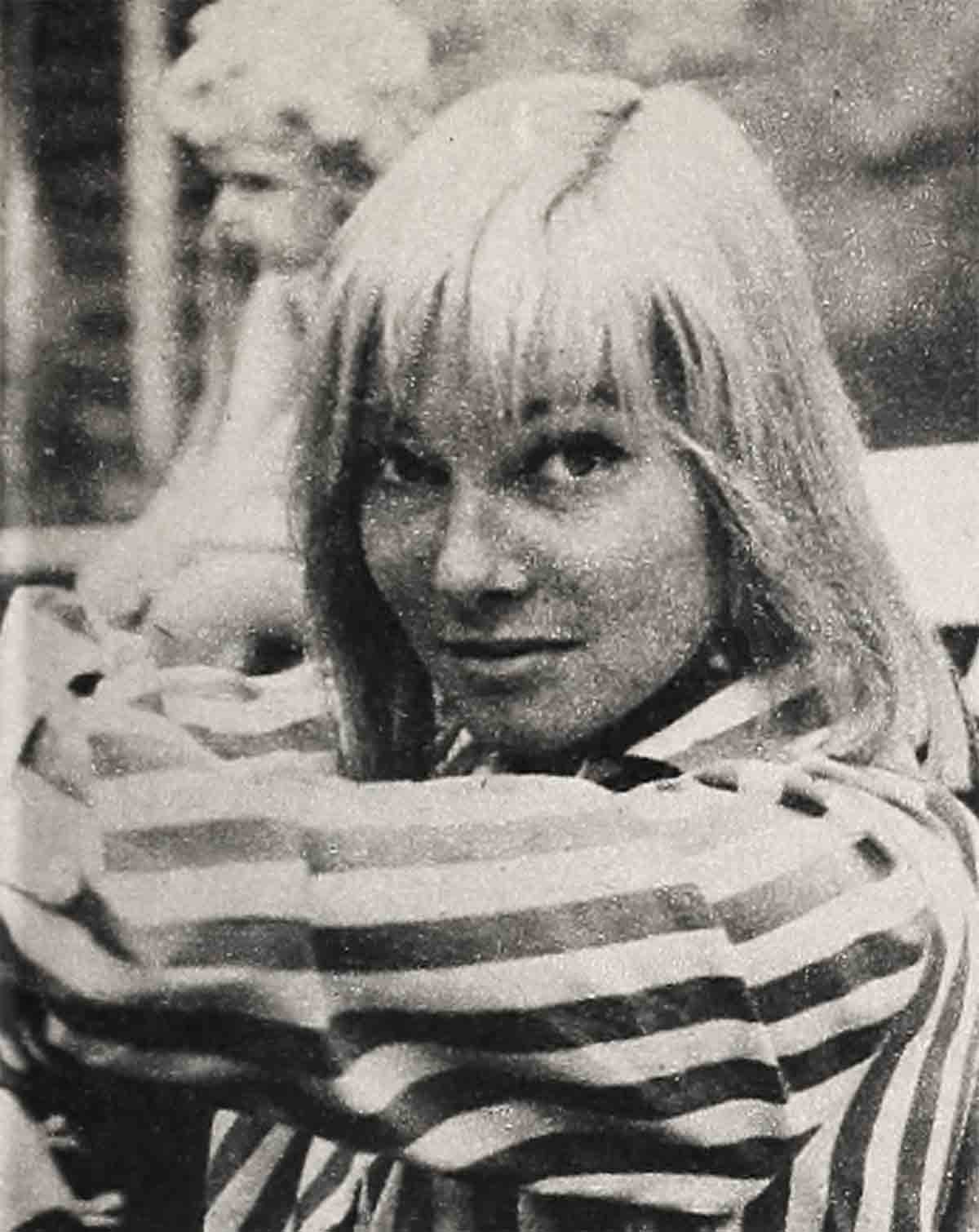
Swede ’n’ Sexy—May Britt
How can she be so cool over all this?” the man wanted to know. “Look what’s happened to her . . . ‘The Young Lions’ and ‘The Blue Angel’ . . . And now all those adjectives—‘The sultriest, sexiest import since Garbo or Dietrich. . . .’ ”
How did she feel about all this—the standing ovation and all that jazz after “Young Lions”?
May faltered a bit, trying to explain. “I suppose I should say that I was flattered and happy,” she stammered. “But actually I think I didn’t believe it was happening. I couldn’t see why it should. I didn’t see what I was doing here, anyway. I never planned to come here.”
And so she didn’t. Her career simply happened to her.
And no one can say she is “cool” about that, as we shall see. She was a lonely girl for a long, long time.
May (she pronounces it “My”) was born in a suburb of Stockholm, Sweden. Her father was, and still is, a postal employee. May did very badly in school, especially at algebra, and finally left to study photography. She thought that might offer an interesting and exciting life, photographing interesting people and events all over the world. She had been at it barely a month when Carlo Ponti came in, did a double take and invited her to go to Rome to make a screen test. May was “cool”. It was her father who urged her, “You may hate yourself later on if you don’t take advantage of this opportunity.” So . . . May went, still in a “cool mood.” “I didn’t expect anything to come of it,” she says, frankly.

What “came of it” was a series of leading picture roles in Italy, winding up with a contract with Twentieth Century-Fox here. “I still don’t know why,” says May. But she is beginning to guess!
Some reasons may be her lissome figure, her blue-grey eyes and her long, blonde, silky uncurled hair. A few freckles scattered here and there don’t do any harm, either.
But, aside from these obviously advantageous physical aspects, there was the innate ability of May to project emotions which registered on the screen. It seemed at first almost as if she did not know she had this ability. But the directors knew it and the screen knew it. May is what they call, with wonder in their eyes and voices, “a natural actress.” There haven’t been many of them. “She simply can’t do anything wrong!” marvels one executive.

But despite all this approval, May was a very lonely girl when she first came to Hollywood. She has been lonely most of her life.
She took a smart little apartment but she resisted firmly the idea of acquiring any possessions other than the personal things that she had.
“I wanted so to make friends,” she says. “But I just didn’t know how. I felt that I had a great capacity for friendship but I couldn’t get people’s confidence. I think I was . . . and still am . . . (here her English faltered) what you call a ‘lonely wolf.’ Do you know that term? I want friends but people frighten me.”
The idea of the beauteous May Britt being “a lonely wolf” was pretty funny, but she was dead serious. She hadbeen lonely.

“I tried,” she said, to do what you called ‘mingling’. I went to parties and parties and parties. I even tried to give parties of my own. Now I think I shall never go to another party. I have . . . what you say? . . . had it!”
She also, about then, made a serious decision. She didn’t like younger men. From there on in she would concentrate only on the more mature males. She was determined to be very firm about that.
Perhaps that was why, when Edward James Gregson, of the fabulously wealthy Janss real estate family, invited her to a small dinner party, she accepted. Mr. Gregson is a widower. He is also old enough to be her father.

But . . . whoops . . . she hadn’t counted on Edward Gregson, Jr., seated on her left during dinner. And would anyone accuse Gregson, pere, of plotting? Heavens, no.
Sparks flew, as sparks so often do, between May and young Gregson. They saw one another almost daily for a few weeks; dinners, horseback rides, swimming, tennis . . . but no parties. Then, inevitably it would seem, the two of them took off for Mexico and were married on February 22, 1958. Was papa Gregson beaming happily in the background? Your guess is as good as anyone’s, including mine.
May was no longer a “lonely wolf” or even a lonely girl.

But there were problems, naturally. (Aren’t there always?) Because by this time May was no longer “cool” to the unexpected film career which had engulfed her. She loved it. And she had been cast for the leading role in “The Blue Angel,” the picture which had made Marlene Dietrich an important star years before. It was a terrific challenge. The adjectives “sultry” and “exciting” are flying again fad May says, “These just make me stammer. I have quite a bad stammer, you know, when I am embarrassed. It’s like my stage fright . . . I suffer terribly from stage fright.
“Yes, I have looked at the original picture of ‘Blue Angel’ and I am now trying hard to forget it. It seemed to me so slow. Dietrich, of course, was lovely and I hope I can follow her. But the action just didn’t seem to me to move.”
The fact that she had to sing in the picture embarrassed her very much. “I can’t carry a tune!” she protested. But she talked her songs well enough to get by and, after all, that’s what Dietrich did in the original. Shecouldn’t sing either.
May’s husband enrolled at Stanford University for some courses and that meant that the two of them must have two homes. They settled for a small apartment in Palo Alto and a sort of guest house at the back of Gregson Senior’s estate in Holmby Hills near Los Angeles, a modest, two-bedroom affair to which May paid scant attention.
“I don’t want any possessions,” she said then. “They just clutter things. And I wouldn’t dream of trying to redecorate. Some day . . .” she added, vaguely, “I suppose we shall have a house of our own and then we shall think about colors and fabrics and we shall start accumulating belongings. But not yet! We still need freedom.”

This “freedom,” to May, meant that they could take off on little trips together when they both had free time. Gregson’s family have a ranch in the San Fernando Valley and the two of them spent many days out there, riding, picnicking, sometimes camping.
Of course, after deciding to concentrate on “older men,” she settled for one two years younger than she is! And it seemed to work just fine. She liked to compete with him athletically.
Most Swedish people are athletic and so is May. She swims well, rides well and she is generally expert at these matters. She has a sense of fun about them and likes to prove herself.
So it happened that she boasted of her prowess on a bicycle to her husband and his roommate at Stanford. They were so amused at this boasting by this small, blonde creature that they’ offered to bet her $500 that she couldn’t ride to Los Angeles in five days. And were they surprised when she took them up!
She made it, all 410 miles of it, in five-and-a-half days, stopping for lunch at noon and at motels at night and calling her husband twice a day.
The only difficulty she had . . . if you call it a “difficulty” . . . was that dozens of truck drivers were so upset at seeing this fragile, golden-haired creature pedal-ling along that they thought they couldn’t bear it if she wouldn’t let them pick up her and her bike and deliver her down the road a score of miles or so.
They followed her into lunch wagon and motels, offering to buy her food, apparently convinced that she must be is a bad way financially to be traveling in so humble a fashion.
“They were nice, generous people,” she said. “They really wanted to help me.”
So . . . she had her $500 and way pretty smug about it, too. She bough presents for both men with the money . . .
“Did you ride back?” we asked he and she sputtered.
“Are you crazy? They didn’t have an other $500 and besides I think that going the other way it is a lot uphill!”
She thinks that perhaps that impromptu trip made her begin to take an interest in cooking . . . at least, in cooking hot dogs and hamburgers.
“I never took the slightest interest in cooking before,” she says. “I didn’t can what I ate or what anyone else ate. But at those stops everything smelled so good and tasted so good. I decided I’d like to try something myself.”
She even learned to mix a “tossed green salad,” although, she admits, “I don’t like all the raw stuff.
THE END
—BY HELEN LOUISE WALKER
It is a quote. SCREENLAND MAGAZINE NOVEMBER 1959




